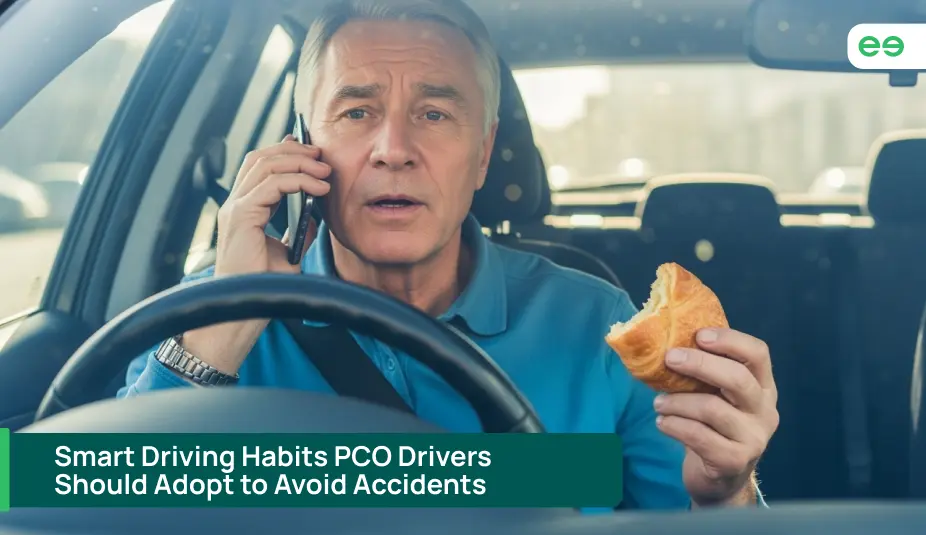Smart Driving Habits PCO Drivers Should Adopt to Avoid Accidents

Accidents can happen at any time and can lead to injuries, financial loss, and legal trouble. If you are a PCO driver, accidents can impact your licence status, income, and ratings as well.
Accidents can happen for many reasons, like difficult road conditions or a moment of distraction. Staying alert and aware of your surroundings reduces the risk of accidents and keeps everyone on the road safe.
In this article, we will discuss driving habits that every driver should adopt to avoid mishaps.






Article Highlights
Follow these steps to reduce your risk of accidents.
- Avoid distractions
- Drive defensively
- Stay alert, and more
Avoid Distractions
Driving requires your full attention. Even a moment of distraction could be fatal and lead to a serious road accident. Here are some of the most common distractions and how to avoid them.
Mobile Phones
Using a phone while driving is illegal and dangerous. It slows your reaction time and increases the risk of accidents. To stay safe, use a Bluetooth device for important calls and avoid texting while driving.
Navigation Systems
PCO drivers mostly use navigation systems, especially when driving through unfamiliar areas. However, this could be dangerous on a busy road, as it takes your focus off the road.
Most navigation apps have a voice instruction feature, use it to guide you through the roads. You can also mount your phone at a level where you can comfortably look at it without looking away from the road.
Food and Drink
Some PCO drivers have a habit of eating while driving. This can reduce your control and attention. So, plan meals or snacks before starting your shift or during breaks. Also, keep your drinks in a cupholder and take sips only when stopped at traffic lights or parked.
Drive Defensively
Defensive driving can also help prevent accidents. Here’s what it means:
Anticipate Risks
Other drivers, cyclists or even pedestrians can be unpredictable. Staying aware of your surroundings helps you spot dangers early and allows you to respond in time, such as when a car pulls out from a side street or a child runs near the road, etc.
Maintain a Safe Distance
Maintaining a safe distance allows you to react in time to sudden stops or obstacles. Ideally, you should maintain a minimum two-car gap for adequate reaction time in case of sudden braking. When following larger vehicles like buses or lorries, increase that distance further because they block your view ahead and can stop suddenly.
Avoid Careless Driving
Always stay alert on the road and maintain your lane. Most accidents happen because of drivers’ carelessness. Drive sensibly on the road, maintain a safe distance from the next car to avoid sudden braking. Use indicators to let the drivers behind you know when you’re changing lanes or overtaking. Always check your mirrors and blind spots before making any move. By following these small steps, you can avoid many accidents on the road and keep everyone safe.
Avoid Blind Overtakes
Overtaking without a clear view of the road ahead could be very dangerous. Wait until the road is clear and free of oncoming traffic before overtaking. Never take any chances with your safety, your passengers’ lives, and the lives of other road users.
At Fleeto, we believe that hiring a PCO car is not just about getting behind the wheel. It’s about driving safely and protecting your passengers. That’s why we provide reliable PCO cars with advanced safety features like lane assist, adaptive cruise control, tilt detection sensors, and more, so you and your passengers can stay safe on the road.
Stay Alert
Driving on busy roads requires sharp focus and quick decision-making, which is only possible by staying alert. Here are some tips to stay alert during your shifts:
Know Your Limits
PCO drivers work long hours. To prevent fatigue, you should take a break every two hours and take a short nap when feeling drowsy.
Hydration and Nutrition
Dehydration and an empty stomach can lead to a lack of concentration and slow reaction time. To stay energised, drink water regularly during your shifts. Keep healthy snacks in your car, such as nuts, bananas, or chicken salad sandwiches, for a quick energy boost.
Read Also: Tired Behind the Wheel? Here’s How to Beat Fatigue and Stay Safe


Adjust for Weather and Road Conditions
Bad weather could bring you more ride opportunities due to cyclists and bikers seeking an alternative mode of travel. Here are some tips to drive safely during:
Rain
The roads become slippery in the rain, and your car needs more time to stop. Maintain a four-second gap with the vehicles ahead during rain to allow your car enough time to stop. You should avoid sudden braking on bends or roundabouts to avoid skidding.

Fog
Fog lowers visibility and can result in mishaps. Use fog lights when the visibility drops below 100 metres to improve your view of the road. Increase your distance from the vehicles ahead to at least 6-8 seconds, and drive at a low speed so you can stop within the distance you can see.
Snowfall
Snow and ice increase stopping distances, making it difficult to control the car. Always use winter tyres in the cold season, avoid sharp manoeuvres, and stick to main roads where the ongoing traffic clears the snow faster.
Avoid Overloading Your Schedule
For PCO drivers using PCO car hire or rent to buy services, the pressure to maximise earnings and make weekly payments can be high. As a result, many drivers start working extended hours. However, overloading your schedule drains you mentally and physically. Here’s what you should do instead:
Set Realistic Shift Limits
Avoid driving more than 8-10 hours per day. Schedule your shifts to cover morning and evening peak hours. This will allow you to complete more rides. Take at least one full day off per week. It will help you recover physically and mentally.
Recognise the Signs of Fatigue
Yawning or difficulty concentrating are signs of fatigue. Sometimes, you may also feel frustrated with other drivers, which could lead to risky behaviour. If you notice these signs, call it a day and go home.
Prioritise Sleep and Recovery
Get at least 7-9 hours of sleep before starting your shift. Lack of rest affects your concentration while driving, ultimately increasing the risk of accidents.

Start Earning Today.
Conclusion
Even the most experienced drivers can get involved in accidents. However, staying alert, being aware of your surroundings, and avoiding distractions while driving can improve your safety on the road.
So, start building safe driving habits today! Your passengers will feel safer, your ratings will stay high, and you’ll worry less about accidents.
Frequently Asked Questions
How to stay safe while driving?
Stay focused on the road, avoid distractions like cellphone, and take regular breaks during your shifts to prevent fatigue and stay active.
Is it illegal to use a mobile phone while driving?
Yes, using a mobile phone while driving can lead to fines and points on your licence. Avoid using it at all costs.
How to drive safely during bad weather?
Maintain a significant distance from the vehicles ahead during rain, and use winter tyres during snowy weather to minimise the risk of accidents.
Suggested Blogs
To get more information like this
Subscribe to our newsletter
Don’t Risk It. Drive a Fully Insured PCO Car With Fleeto!
Accidents are unpredictable, but your protection shouldn’t be. Our fully insured PCO cars include extensive accident coverage, helping you avoid costly repairs, legal issues, and loss of income. Stay on the road safely and stress-free with Fleeto.
